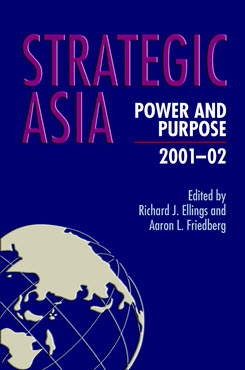Japan (Strategic Asia 2001-02)
During the past year, Japan’s security policy was shaped decisively by the emergence of a more palpable threat from North Korea. This prompted Tokyo to bolster its alliance with the United States, toughen its stance toward Pyongyang, align its policies more closely with Washington’s toward other members of the so-called “axis of evil,” and modestly extend the parameters of its evolving international role as a source of offshore, noncombat, logistic services and humanitarian assistance.
During the past year, Japan’s security policy was shaped decisively by the emergence of a more palpable threat from North Korea. This prompted Tokyo to bolster its alliance with the United States, toughen its stance toward Pyongyang, align its policies more closely with Washington’s toward other members of the so-called “axis of evil,” and modestly extend the parameters of its evolving international role as a source of offshore, noncombat, logistic services and humanitarian assistance. Japan sought, meanwhile, to enhance its diplomatic maneuverability and diversify its sources of energy by cultivating relations with the major powers—especially China—and other countries of consequence. Tokyo competed with predictable zeal for export opportunities, and encouraged forms of Asian regional cooperation that may offer an eventual counterweight to NAFTA and the European Union. Internal factors influencing Japan’s security policies included economic malaise, the complexities of coalition government, and rising nationalist sentiments.
Strategic Asia
The Strategic Asia annual edited volume incorporates assessments of economic, political, and military trends and focuses on the strategies that drive policy in the region. Learn more about Strategic Asia.


